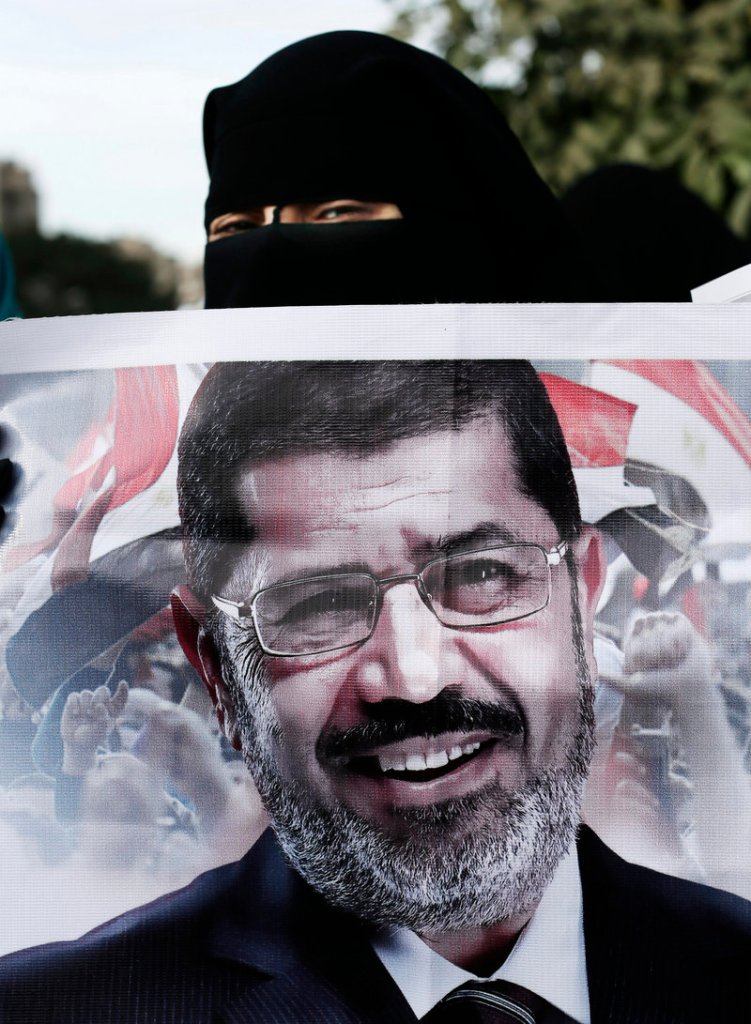CAIRO — Most Egyptian judges rejected any role Tuesday in overseeing the country’s constitutional referendum, a move likely to cast further doubt on the legitimacy of the disputed charter.
The nation’s worst crisis since Hosni Mubarak’s ouster nearly two years ago also forced the government to put off a crucial deal with the International Monetary Fund for a $4.8 billion loan, shattering any hope for recovery of the country’s ailing economy anytime soon.
On one side of the divide is President Mohammed Morsi, his Muslim Brotherhood and their ultra-conservative Islamist allies, against an opposition camp of liberals, leftists and Christians who contend the draft charter restricts freedoms and gives Islamists vast influence over the running of the country.
An unexpected twist came when the defense minister, a Morsi appointee, invited the opposition, along with judges, media leaders and Muslim and Christian clerics to an informal gathering Wednesday, saying he was doing so in his personal – not an official – capacity.
It was the second time this week that the nation’s powerful military has addressed the crisis, signaling its return to the political fray after handing over power in June to Morsi, Egypt’s first civilian president.
The military sees itself as the guarantor of Egypt’s interests and secular traditions. Earlier this week, it warned of disastrous consequences if the crisis over the country’s draft constitution is not resolved. “We will only sit together … For the sake of every Egyptian, come and disagree. But we won’t be cross with one another or clash,” Defense Minister Abdel-Fatah el-Sissi, said on state television.
“We are not concerned with politics. We want to reassure the people that we can sit together,” added Maj. Gen. Mohammed el-Assar, el-Sissi’s deputy, speaking on a private TV network.
The opposition said it would not participate in any meeting that was nothing more than an informal gathering. The Brotherhood said it would attend.
Egypt’s political crisis began on Nov. 22 when Morsi issued a decree granting himself – and the Islamist-dominated panel that drafted the constitution – immunity from judicial oversight or challenge, sparking mass demonstrations.
The constituent assembly then hurriedly approved the draft constitution in a marathon overnight session, prompting hundreds of thousands of the president’s opponents to take to the streets in massive rallies – the largest since the uprising that toppled Mubarak in February 2011.
The vast majority of Egypt’s judges, meanwhile, said Tuesday they would not oversee the referendum on the draft constitution. Ahmed el-Zind, chairman of the Judges’ Club and a fierce Morsi critic, told a news conference that 90 percent of the nation’s judges would join the boycott.
The move was unlikely to stop the referendum from taking place, but it cast further doubt on the legitimacy of the constitutional drafting process and, ultimately, the document itself.
Late Tuesday, Morsi issued a decree declaring the vote would be staggered over two days, Dec. 15 and Dec. 22, a move designed to make up for the shortage of judges. A one-time Mubarak supporter, el-Zind has led the judges angered by what they see as Morsi’s “assault” on the judiciary.
Zaghloul el-Balshi, head of the referendum’s organizing committee, told the private ONTV network that 9,000 judges had agreed to oversee the voting. His claim could not be independently verified.
Prime Minister Hesham Kandil, meanwhile, said Egypt requested a postponement of the $4.8 billion IMF loan after Morsi suspended a package of tax hikes that had been part of a program to reduce Egypt’s huge budget deficit.
Copy the Story Link
Send questions/comments to the editors.



Success. Please wait for the page to reload. If the page does not reload within 5 seconds, please refresh the page.
Enter your email and password to access comments.
Hi, to comment on stories you must . This profile is in addition to your subscription and website login.
Already have a commenting profile? .
Invalid username/password.
Please check your email to confirm and complete your registration.
Only subscribers are eligible to post comments. Please subscribe or login first for digital access. Here’s why.
Use the form below to reset your password. When you've submitted your account email, we will send an email with a reset code.